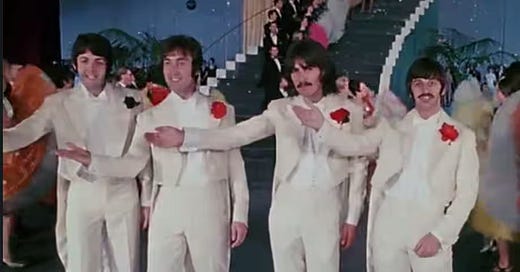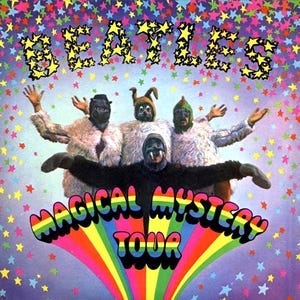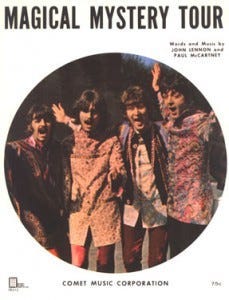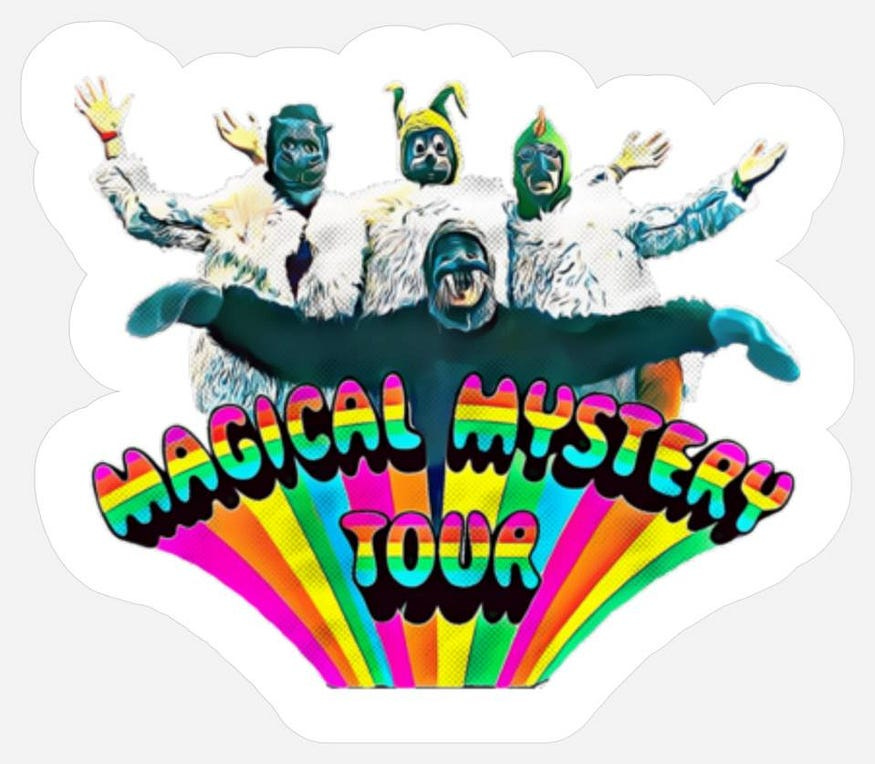The Beatles’ Worst Album is Their Greatest Achievement
Teetering on the brink of collapse, The Beatles released their worst album, and it saved their legacy.
Recently, I was asked what I consider to be the worst Beatles album. My answer: Magical Mystery Tour.
However, understanding the band’s worst album is inseparable from understanding the creative journey that led them there. This is evident for a couple of reasons:
The group was facing challenges personally and professionally.
Lennon found himself in a creative slump.
McCartney’s increasing control led to conflicts within the group.
Despite my initial skepticism about Magical Mystery Tour’s artistic value, I quickly realized I had completely misunderstood its significance. Ironically, as the story unfolded, I found it was also their greatest achievement.
’67 Summer of Love
Four days after concluding the groundbreaking Sgt. Pepper recording sessions in late April of 1967, The Beatles, or more precisely, McCartney, swiftly transitioned into their next project: the Magical Mystery Tour. Brimming with ideas, Paul envisioned this undertaking as a multimedia psychedelic experience centered around an unscripted film influenced by the Merry Pranksters, a commune who embarked on a 1964 trip across America in a multicolored bus handing out LSD. Drawing from childhood memories of bus tours in Liverpool and the Merry Pranksters stunt, the concept for their own Magical Mystery Tour was born.
Their plans changed unexpectedly when they were invited to join an international satellite broadcast called Our World. In June ’67, The Beatles captivated audiences with All You Need is Love, which aired live in 25 countries. With high-profile guests such as Keith Moon, Eric Clapton, Keith Richards, Mick Jagger, Marianne Faithful, and Graham Nash lining the perimeter of the studio, the event marked a pivotal moment in their journey, embodying the cultural spirit of the “Summer of Love.”
After the 700 hours spent recording Sgt. Peppers and the accompanying singles earlier that Spring, the group was mentally drained and needed a break.
Led by George Harrison, the Beatles sought refuge in Bangor, Wales, to rejuvenate their minds and spirits. But this wasn’t just any vacation; they were attending a seminar led by Maharishi Mahesh Yogi to learn the practice of transcendental meditation.
What was intended to be a peaceful and spiritual reawakening was interrupted by deep tragedy. Brian Epstein, The Beatles’ beloved manager, died at age 32 from an accidental overdose of sedatives and alcohol. His death forever altered the band’s personal and professional lives drastically.
And In the Middle Of The Celebrations, I Break Down
The group abruptly left the seminar in shock. Brian wasn’t just a manager to John, Paul, George, and Ringo; he was family. His importance cannot be overstated. From the group’s earliest days, he stood by them personally, helping them in ways a “typical” manager rarely would.
When John’s girlfriend Cynthia became pregnant, Brian served as the best man at their wedding and covered the reception dinner costs. Lennon later asked Brian to be the godfather of his first son, Julian, further illustrating their mutual respect and close friendship.
With Brian gone, the Beatles were lost in a sea of indecision. For the first time in their professional career, they lacked an “older” authority figure to guide them. Brian had also filled the role of mediator in times of conflict. Without this leadership outside of the group, they were directionless.
In fact, John Lennon feared that the end of the band was near. Later, in a Rolling Stone interview, Lennon discussed Brian’s death: I was stunned. I don’t know whether you’ve had it, but I’ve had a lot of people die around me, and the other feeling is: ‘What can I do?’
Though the Beatles hadn’t disbanded, they needed a fresh start. John, fully aware of the precarious situation, also recalled, “I knew that we were in trouble then. I didn’t really have any misconceptions about our ability to do anything other than play music.”
Realizing the band’s need to get back to work, McCartney took the reins and revived the “Magical Mystery Tour” project: an unscripted film to be coupled with recording fresh tracks and a soundtrack. McCartney saw this as an opportunity to unleash the band’s creativity, evoking the experimental essence of Sgt. Pepper.
Not everyone shared McCartney’s enthusiasm for numerous reasons.
The magic of Sgt. Pepper’s couldn’t be replicated, no matter the spontaneity involved.
The logistical hurdles were demanding.
Without Brian Epstein handling business matters, the band now faced the tedious task of managing the operational logistics themselves.
Also, the members felt bullied by McCartney’s insistence on returning to the studio. This complaint persisted over the years as Paul asserted greater and greater control over the group. John criticized Paul’s self-centered nature to start working as soon as he had songs written while disregarding Lennon’s need for more time to write new material.
Nonetheless, they began filming in September 1967 and it premiered in black and white on BBC 2 on January 5th, 1968, which diluted the intended impact of its vibrant sets and imagery. The reception was far from favorable, with critics offering lukewarm to scathing reviews.
However, the soundtrack was a smash hit, winning over fans and critics alike. So, with songs like I Am The Walrus, how could Magical Mystery Tour be The Beatles’ “worst” release? In a word: retread.
Deconstructing The Beatles Worst Album
The Beatles released “Magical Mystery Tour” as a double EP in the UK on November 27, 1967. However, the US received an “upgraded” 11-song album a week prior, including previously released singles, overriding their artistic vision.
The group continuously evolved artistically throughout their careers until Magical Mystery Tour. From their early albums, such as Please Please Me, With The Beatles, and A Hard Day’s Night, there was growth in both songwriting quality and musical sophistication.
In 1965, the band reached another artistic plane with Rubber Soul, followed by Revolver and Sgt. Pepper. Their themes, melodies, and musicality progressed significantly, marked by inventive basslines, unconventional drum patterns, and studio experimentation.
Furthermore, this period showcased McCartney’s prolific songwriting phase, tilting the balance of the Lennon-McCartney creative partnership toward him.
Lennon and McCartney had always had a creative ebb and flow. However, in 1967, Lennon’s creative well was becoming dry after he penned songs like Strawberry Fields Forever, A Day in The Life, All You Need Is Love, and Lucy in The Sky With Diamonds, just to name a few. McCartney’s song bank was also shallow and artistically below par.
The Review…
With the release of Magical Mystery Tour, The Beatles revisited familiar musical territory for the first time in their career, recycling material in a format similar to Sgt. Pepper’s.
Tracklisting:
1. Magical Mystery Tour (McCartney)
2. Your Mother Should Know (McCartney)
3. I Am The Walrus (Lennon)
4. The Fool on The Hill (McCartney)
5. Flying (Lennon, McCartney, Harrison, Starkey)
6. Blue Jay Way (Harrison)
The double EP launches with a nod to Sgt. Pepper as Paul beckons listeners to “step right this way” and “roll up for the Magical Mystery Tour.” The energetic opening isn’t horrible, but it’s essentially a rewrite of Sgt. Pepper. Your Mother Should Know is yet another Sgt. Pepper rewrite, this time attempting to recreate When I’m Sixty-Four. Unfortunately, the cabaret number falls flat, lacking the memorable craftsmanship and melody of its “older brother.”
Finally, three songs into the record, Lennon’s I Am The Walrus, his sole contribution (sort of), emerges as the first substantial standout.
The four-minute burst of bold creativity is unquestionably the highlight of the EP. Embodying Lennon’s playful lyrical spirit with memorable lines like “I am he as you are he as you are me and we are all together” and the iconic “I am the Eggman, Goo goo job” makes it an instantly recognizable track. Musically, it cascades with the sonic intensity of a waterfall, as George Martin’s creative orchestration adds an extra layer of excitement.
I Am the Walrus has firmly stood the test of time. But can the same be said for McCartney’s third song, The Fool on The Hill? Just as the record gained momentum, McCartney had another artistic misfire with the overly serious The Fool on The Hill.
The song’s melodic charm shines through as McCartney’s lyrics narrate the tale of a fool who, in reality, holds wisdom, observing others caught up in a world he has learned to transcend. But lyrically, it lacks the haunting sentiments of Eleanor Rigby, or the heartache and longing of Yesterday. Musically, it’s absent of the complexity of other ballads from the era, like Here, There, and Everywhere, known for their rich harmonies and innovative chord changes, setting a high standard in songwriting.
The penultimate track, Flying, represents an (unneeded) milestone for the Fab Four. It’s their first officially released instrumental piece and the first track on which each member receives a songwriting credit.
Despite its playful nature, the song falters, especially during the uncertain outro, as it floats away in a forgettable, hazy swirl of sound, fading into obscurity.
Unlike the timeless musical statement of A Day In The Life from Sgt. Pepper, Mystery Tour concludes with Harrison’s Blue Jay Way, a plodding, meandering, and disjointed song lamenting the frustrations of waiting on your friends running late. Although not his intent, Harrison captures the experience of boredom and impatience perfectly as the tune overstays its welcome. Ironically, its finale repeats, “Don’t be long,” as the song wraps up four minutes of going nowhere.
The U.S. received five more (far superior) tracks grabbed from previous singles: Hello Goodbye, Strawberry Fields Forever, Penny Lane, Baby You’re a Rich Man, and All You Need is Love. But this was merely a ploy to fill out The Beatles’ intended double EP for the American market. Not to mention the singles included on the U.S. album were recorded and released prior to the Magical Mystery Tour sessions.
In Summary:
McCartney dominates the record with three subpar songs.
Lennon and Harrison contribute one each, aside from Flying.
Fool on The Hill and I Am The Walrus are the only tracks that haven’t fallen into obscurity (in the mainstream).
I Am The Walrus is the one song that tip-toes into new territory.
With such harsh criticism, how could Magical Mystery Tour also be their greatest achievement?
The Joker Laughs At Me
How could The Beatles have fallen from the musical heights of Tomorrow Never Knows, Strawberry Fields Forever, Penny Lane, A Day In The Life, and Penny Lane to the mediocrity of Your Mother Should Know, Blue Jay Way, and Flying within a matter of months?
The real mystery is how they hadn’t sooner. But the second half of 1967 puts it into perspective:
They were reeling from the profound personal loss of their manager, Brian Epstein.
The group was emotionally drained, artistically spent, and looking for answers.
When McCartney began exerting more artistic control and overall direction as the de facto leader, lingering tensions and new conflicts boiled over, especially as Apple Corp came to fruition.
Lastly, the project suffered from a severe lack of direction, preparation, and overall cohesion.
Yet, within months, they bounced back from this slump and delivered “The White Album,” a 30-song masterpiece. Lennon’s creative juices flowed anew. Harrison showcased his finest work yet, and McCartney, too, regained his momentum, crafting energetic tracks like Helter Skelter and Back in The U.S.S.R. along with the gentle Blackbird.
While Magical Mystery Tour may not be their best work, it stands as their greatest achievement.
The shortcomings of Magical Mystery Tour led them to reassess their musical direction and return to their roots as a means to evolve forward. This propelled them onto a new path of brilliance. It flooded their final two years with many of the group’s greatest artistic highs. And when they broke up, at their creative peak, it cemented them as the greatest band of all time, thanks to The Beatles’ “worst” album.
As always, thanks for reading. Click here to keep up-to-date with all my work.
-Daniel










Another great analysis Daniel. Maybe MMR fulfilled a similar role to Help, propelling them forward again.